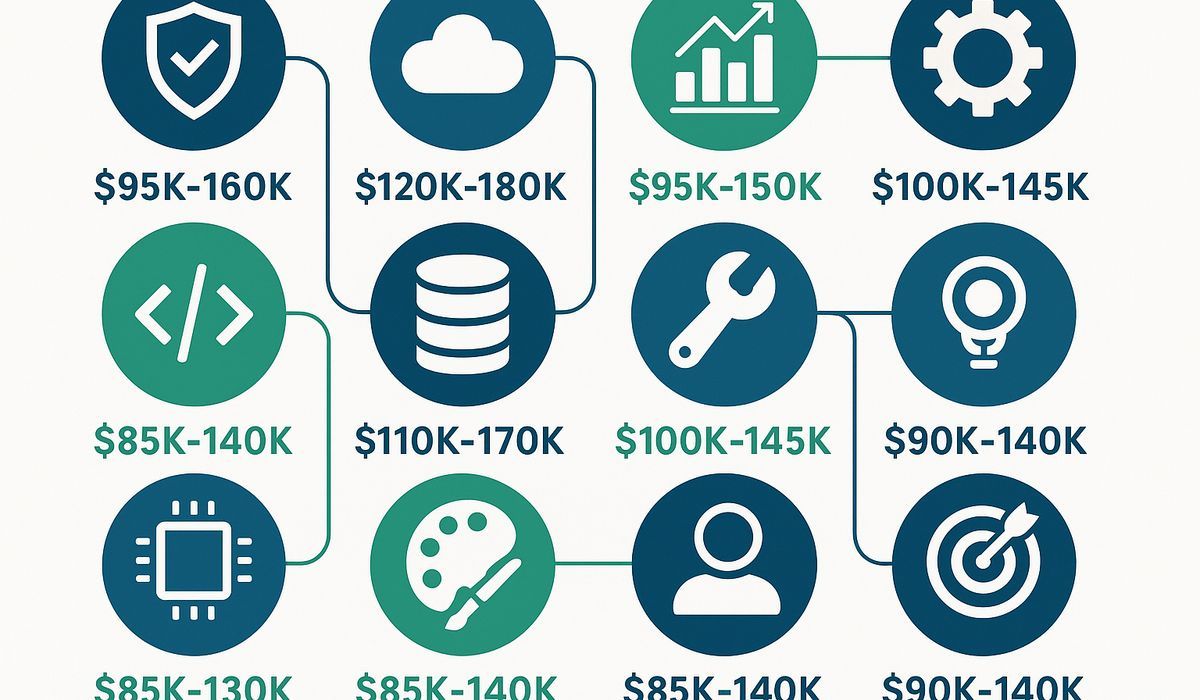10 ‘New-Collar Careers’ Paying Six-Figure Annual Salaries In 2025. College graduates are drowning in $37,000+ debt while many “new-collar” workers are earning $100,000-$200,000 annually without traditional degrees. These skills-based careers are reshaping the job market, and smart professionals are capitalising on this massive shift.
What Are New-Collar Careers?
IBM CEO Ginni Rometty coined “new-collar jobs” to describe roles that require specialised skills but not necessarily four-year degrees. These positions focus on what you can do, not where you went to school. They’re the fastest-growing segment of high-paying careers in 2025.
The math is stunning: While college costs skyrocket and graduate job prospects diminish, new-collar careers offer immediate earning potential with shorter training periods. Some of these roles can be learned in 3-12 months.
The 10 Highest-Paying New-Collar Careers
 1. Cybersecurity Specialist- $85,000-$140,000
1. Cybersecurity Specialist- $85,000-$140,000
What You Do: Protect companies from digital threats, monitor security systems, and respond to breaches. Skills Needed: Network security, ethical hacking, risk assessment, and security software. Path In: CompTIA Security+ certification (3-6 months), cybersecurity bootcamps, self-study with home labs. Why It Pays: Cyberattacks cost companies $4.45 million on average. Security experts are worth their weight in gold.
2. Cloud Solutions Architect ($95,000-$160,000)
What You Do: Design and implement cloud computing strategies for businesses migrating from traditional servers. Skills Needed: AWS/Azure/Google Cloud platforms, system architecture, cost optimisation. Path In: Cloud certification programs (AWS Solutions Architect), online labs, vendor training. Why It Pays: 94% of enterprises use cloud services. Companies need experts to avoid costly mistakes.
3. Data Analyst ($70,000-$120,000)
What You Do: Transform raw business data into actionable insights that drive million-dollar decisions. Skills Needed: SQL, Python/R, Excel mastery, data visualisation (Tableau, Power BI). Path In: Google Data Analytics Certificate, Coursera specialisations, Kaggle competitions. Why It Pays: Data-driven companies are 23x more likely to acquire customers. Every business needs data experts.
4. UX/UI Designer ($80,000-$130,000)
What You Do: Design digital experiences that users love, improving app interfaces and website functionality. Skills Needed: Design thinking, prototyping tools (Figma, Sketch), user research, psychology basics. Path In: Design bootcamps, portfolio development, freelance projects, and online courses. Why It Pays: Poor user experience costs companies billions. Good design directly impacts revenue.
5. Digital Marketing Specialist ($65,000-$115,000)
What You Do: Drive online growth through SEO, social media, paid advertising, and content strategy. Skills Needed: Google Ads, Facebook Ads, analytics, content creation, A/B testing. Path In: Google Digital Marketing Certificate, HubSpot certifications, agency internships. Why It Pays: Digital marketing ROI averages $2 for every $1 spent. Results are directly measurable.
6. DevOps Engineer ($90,000-$150,000)
What You Do: Bridge the gap between software development and IT operations, automating deployment processes. Skills Needed: Linux, Docker, Kubernetes, CI/CD pipelines, scripting languages. Path In: Linux certifications, Docker training, GitHub projects, DevOps bootcamps. Why It Pays: DevOps practices reduce deployment failures by 96%. Companies desperately need this expertise.
7. Technical Sales Engineer ($85,000-$160,000)
What You Do: Sell complex technical products by understanding both business needs and technical requirements. Skills Needed: Technical product knowledge, sales methodology, presentation skills, and problem-solving. Path In: Sales experience + technical training, vendor certifications, shadowing experienced reps. Why It Pays: Technical sales reps often earn 6-figure base salaries plus commissions exceeding $50,000.
8. Salesforce Administrator ($75,000-$125,000)
What You Do: Customise and maintain Salesforce CRM systems that run entire sales organisations. Skills Needed: Salesforce platform expertise, workflow automation, user training, and data management. Path In: Salesforce Trailhead (free), administrator certification, volunteer projects. Why It Pays: Over 150,000 companies use Salesforce. Certified admins are in constant demand.
9. Content Creator/Social Media Manager ($60,000-$110,000)
What You Do: Build brand awareness and engagement through strategic content across digital platforms. Skills Needed: Content strategy, video editing, analytics interpretation, and trend awareness. Path In: Build personal brand first, freelance clients, social media certifications, portfolio development. Why It Pays: Brands spend $16 billion annually on influencer marketing. Content drives modern business growth.
10. Project Manager ($70,000-$130,000)
What You Do: Coordinate teams, budgets, and timelines to deliver complex projects on schedule and within budget. Skills Needed: PMP methodology, stakeholder management, risk assessment, and communication skills. Path In: Project Management Professional (PMP) certification, Agile/Scrum training, volunteer project leadership. Why It Pays: Failed projects cost companies $109 million per $1 billion invested. Good PMs save millions.
Why New-Collar Jobs Are Recession-Proof
- Skills Over Degrees: These roles focus on measurable abilities and results, not educational pedigree.
- High Demand, Low Supply: Traditional education hasn’t caught up to industry needs, creating talent shortages.
- Continuous Learning: New-collar workers stay current with technology, making them more adaptable than traditional employees.
- Direct ROI: These roles generate immediate, measurable value for companies, making them essential even during downturns.
Your 90-Day Action Plan
- Days 1-30: Choose one career from this list based on your interests and current skills. Research salary ranges in your area.
- Days 31-60: Start learning through free resources, online courses, or bootcamps. Build your first project or certification.
- Days 61-90: Create a portfolio, update LinkedIn, start networking in your chosen field, and apply for entry-level positions.
The Bottom Line
While college costs continue rising and traditional career paths become uncertain, new-collar careers offer a direct route to financial stability and growth. These aren’t “alternative” careers anymore – they’re becoming the mainstream.
The opportunity is massive, but timing matters. As more people discover these paths, competition will increase. The best time to start was yesterday. The second-best time is today.
Your next six-figure salary might be just one certification away.


 1. Cybersecurity Specialist- $85,000-$140,000
1. Cybersecurity Specialist- $85,000-$140,000